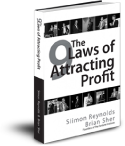
If you’re unhappy with your company’s progress there’s one area you should take a good look at.
Your search for perfection.
In business, aiming for perfection is usually regarded as a positive, but in my experience if the leader of a company is focused on getting things absolutely perfect it’s more often a negative. There are several reasons why.
Firstly, it massively slows down the introduction of new products. When you endlessly finesse your latest offering so that it can be as good as it can possibly be, you feel good inside but your speed to market suffers enormously.
In a world where those that are first to market often end up owning the space, if you’re not careful your company can end up being perceived as merely a follower.
Remember, followers often can’t charge premiums and find it difficult to build their brands.
Secondly, perfection postpones input from the customer. You should rush your products out to the market, so that the most important person, the customer, can give you quick feedback.
The masters of this strategy used to be Microsoft, in the Eighties. In those days they would get new products to market at a blistering pace, then listen closely to the public’s opinions of it. Several months later they would release a refinement of the software based on that feedback.
Result? Ultimately a much better product than had they tinkered with it for ages at headquarters.
Thirdly, perfection is often not rewarded by the customer. I can only speak generally here because there are indeed markets that look for the ultimate, but not as many as you may think. In many categories, the company with the highest revenue does not produce the products that industry experts regard as the best.
I’ll bet in your industry you know players that are far bigger than you, but that produce inferior products.
There’s a lesson in this. You get rich in business by giving customers what they want – not necessarily more than they want.
Perfection is certainly a noble aim, but as per in our best business coaching program in business not always a wise one. Sure, aim high, but get it out the door fast. You’ll quickly discover what customers really desire and likely make more money to boot.
They say fortune favours the brave. I think it favours the fast.














